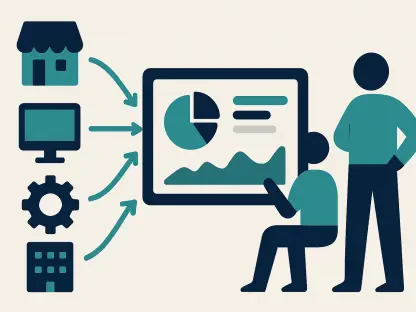With an ever-increasing number of fraudulent insurance claims shaking the UK insurance industry, companies like Aviva are stepping up their game. The year 2024 recorded a notable surge in dishonest claims, prompting Aviva to take a closer look at its processes and technology to counteract this worrying trend. Aviva reported a 14% increase in declined insurance claims due to suspected fraud, encapsulating 12,700 suspect claims alone in monetary terms of around £127 million. This translated to an average of 35 fraudulent claims daily, equating to approximately £349,000 each day. The substantial rise in fraudulent insurance applications, nearly doubling from the previous year to over 98,000 cases, underscores the urgency of this matter. Companies like Aviva are making substantial investments in cutting-edge technologies and rigorous staff training to enhance fraud detection capabilities, showcasing the company’s intensified efforts to maintain the integrity of insurance claims amidst this troubling surge.
Significant Advancements in Fraud Detection
To address the rising number of fraudulent claims, Aviva has significantly ramped up its investment in advanced analytics and machine learning technologies. These tools are indispensable in identifying and flagging suspicious claims, which are then further scrutinized by specialized fraud teams. Machine learning algorithms analyze vast amounts of data to detect patterns indicative of fraudulent activities. This includes examining the frequency and nature of claims submitted by an individual, cross-referencing these with industry-wide data, and identifying anomalies that may suggest fraudulent behavior.
Additionally, Aviva’s enhanced training programs for its staff have made a significant impact. By equipping employees with the latest knowledge in fraud detection techniques, the company ensures that its workforce is well-prepared to tackle fraudulent claims effectively. This dual approach of leveraging technology and human expertise provides a robust defense mechanism against the ever-evolving tactics of fraudsters. The company’s focus on continuous improvement and adaptation to new fraudulent schemes plays a crucial role in maintaining the integrity of the insurance system.
The Rise of Fraudulent Activities
In 2024, the landscape of fraudulent insurance claims in the UK underwent substantial changes. Notably, there was a 39% increase in detected claims fraud from the previous year. Aviva scrutinized 14,600 more claims for potential fraud following this sharp rise. The majority of these fraudulent claims were related to motor insurance, which constituted approximately 75% of all fraudulent activities. Exaggerated injury claims, inflated repair costs, and dishonest credit hire charges were the primary culprits. The year saw a staggering 24% rise in exaggerated motor damage claims, indicating a significant focus area for fraudsters.
Emerging fraud trends also included deceptive ‘spoof ads’ from claims and accident management companies. These ads misled motorists into making fraudulent claims, resulting in disputed charges. Public liability fraud saw a 12% increase as organized fraudsters shifted their focus after the implementation of whiplash reforms. Common tactics included staged slip, trip, or fall incidents. While employer’s liability claims remained relatively stable, household insurance fraud mainly involved opportunistic dishonesty, with claimants exaggerating or fabricating losses of personal items such as electronics and jewelry.
Strategies and Technological Solutions
Aviva’s strategies to combat fraudulent claims are multi-faceted, encompassing both preventive and detective measures. Preventive measures include rigorous identity verification at the application stage, extensive data analytics to assess risk, and education initiatives aimed at informing customers about the repercussions of committing fraud. Aviva’s substantial investment in machine learning and artificial intelligence plays a pivotal role in these preventive efforts, allowing for real-time risk assessment and prompt flagging of suspicious activities.
On the detective front, Aviva has set up specialized anti-fraud units that work in tandem with law enforcement agencies to investigate and prosecute fraudulent activities. These units employ advanced data analytics tools to dissect claims data thoroughly, uncovering hidden patterns that may indicate fraud. Furthermore, Aviva collaborates with other insurance companies and industry bodies to share information and combat fraud collectively. This collaborative approach helps in drawing a comprehensive picture of fraud trends and devising industry-wide strategies to tackle them.
The Future of Fraud Prevention
Looking ahead, Aviva is committed to staying at the forefront of fraud prevention through continuous innovation and adaptation. The company’s future strategy includes enhancing its technological capabilities, particularly in the realms of big data and machine learning. By continually updating these technologies, Aviva aims to stay one step ahead of fraudsters, who are constantly evolving their tactics. Increasing international cooperation is also on the agenda, as insurance fraud is not confined to national borders. By sharing insights and strategies with global partners, Aviva can better protect itself against international fraud schemes.
Another critical aspect of the future of fraud prevention is consumer education. Aviva plans to invest more in educating its customers about the signs of insurance fraud and the severe consequences of engaging in such activities. This proactive approach not only helps in preventing fraud but also in fostering a culture of honesty and integrity within the insurance industry. Ultimately, Aviva’s comprehensive and forward-thinking strategies signify its unwavering commitment to ensuring the fairness and reliability of the insurance process.
Commitment to Integrity
To combat the growing surge in fraudulent claims, Aviva has substantially increased its investment in advanced analytics and machine learning. These cutting-edge tools are essential for identifying and flagging potentially suspicious claims, which are then carefully examined by specialized fraud units. Machine learning algorithms sift through extensive data to uncover patterns that suggest fraudulent activity. This involves reviewing the frequency and nature of individual claims, cross-referencing them with industry-wide data, and pinpointing anomalies that could indicate fraud.
Moreover, Aviva has significantly improved its staff training programs, which have had a profound impact. By equipping employees with up-to-date knowledge in fraud detection methodologies, the company ensures its workforce is well-equipped to address fraudulent claims effectively. This combined strategy of utilizing both technology and human expertise forms a strong defense against the continuously evolving tactics of fraudsters. The company’s commitment to ongoing improvement and adaptation to new fraud schemes is crucial in preserving the integrity of the insurance system.









